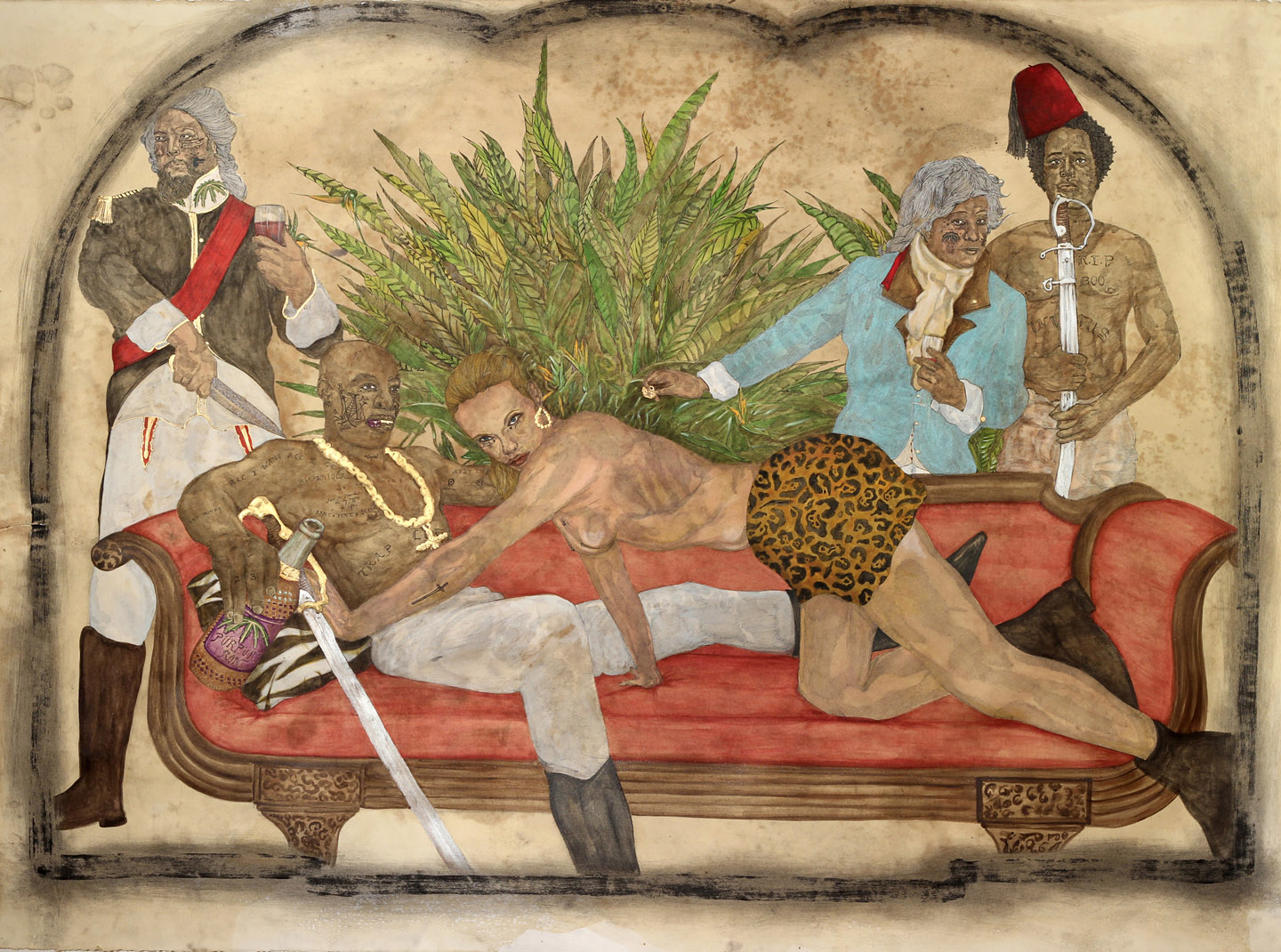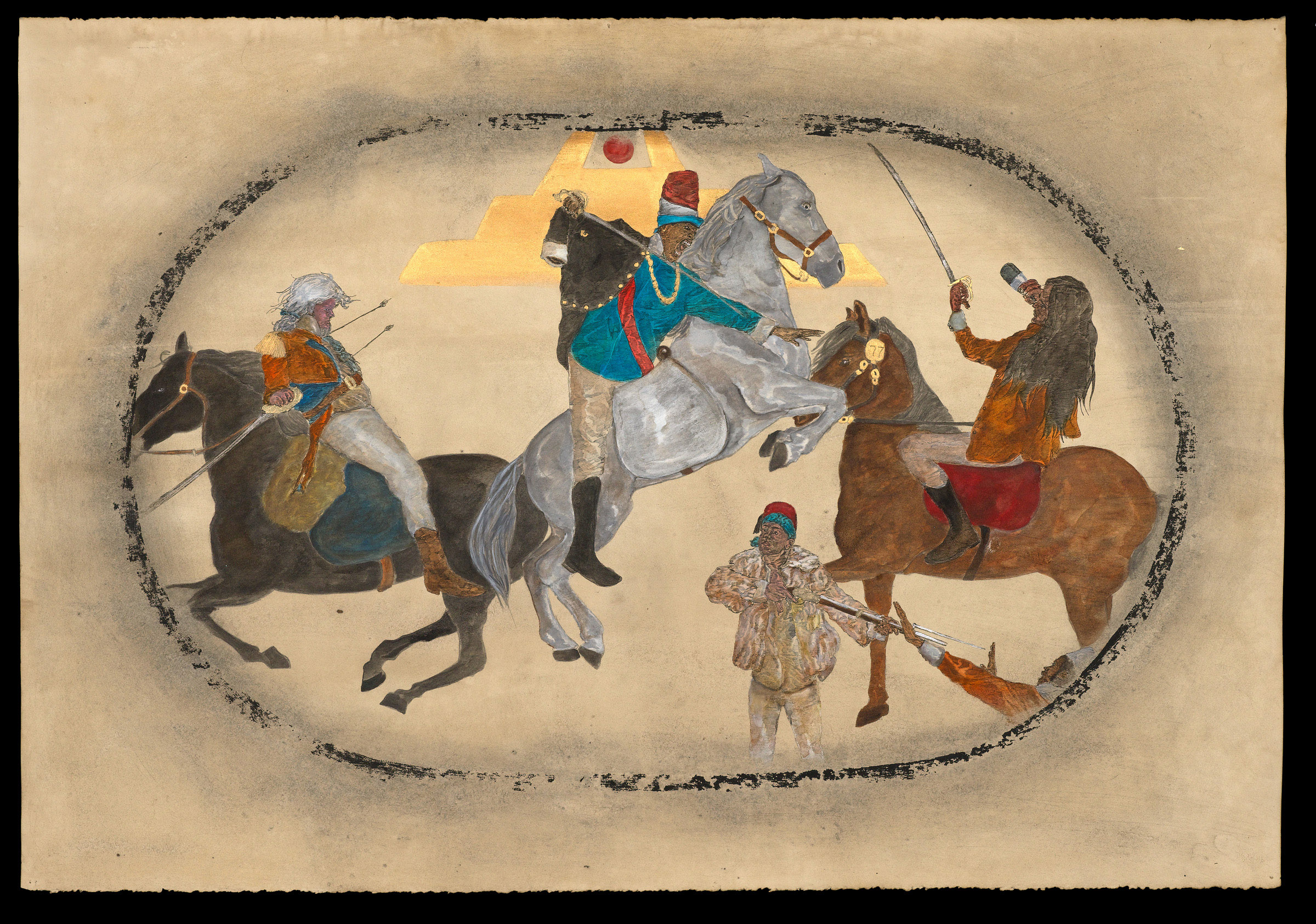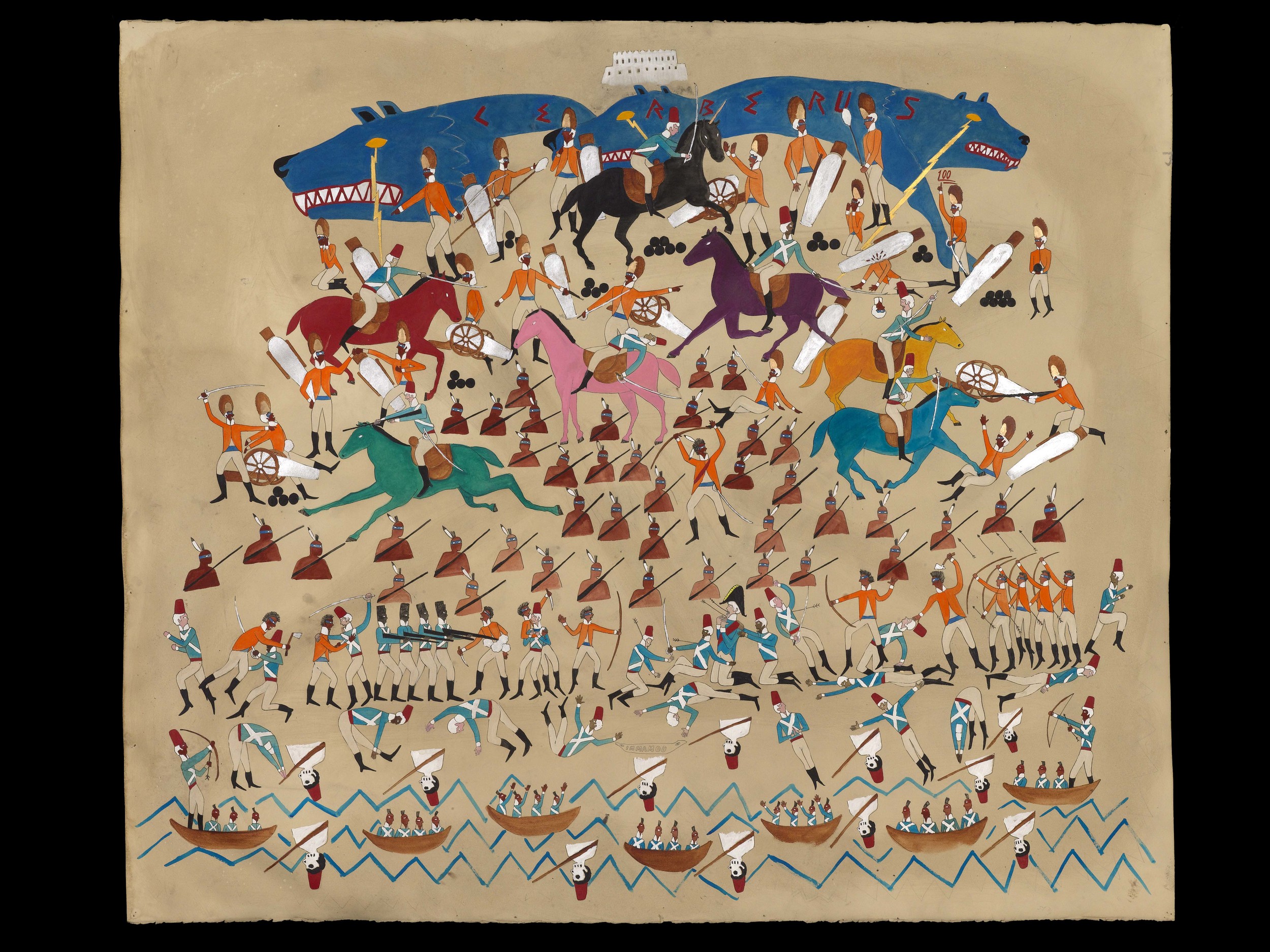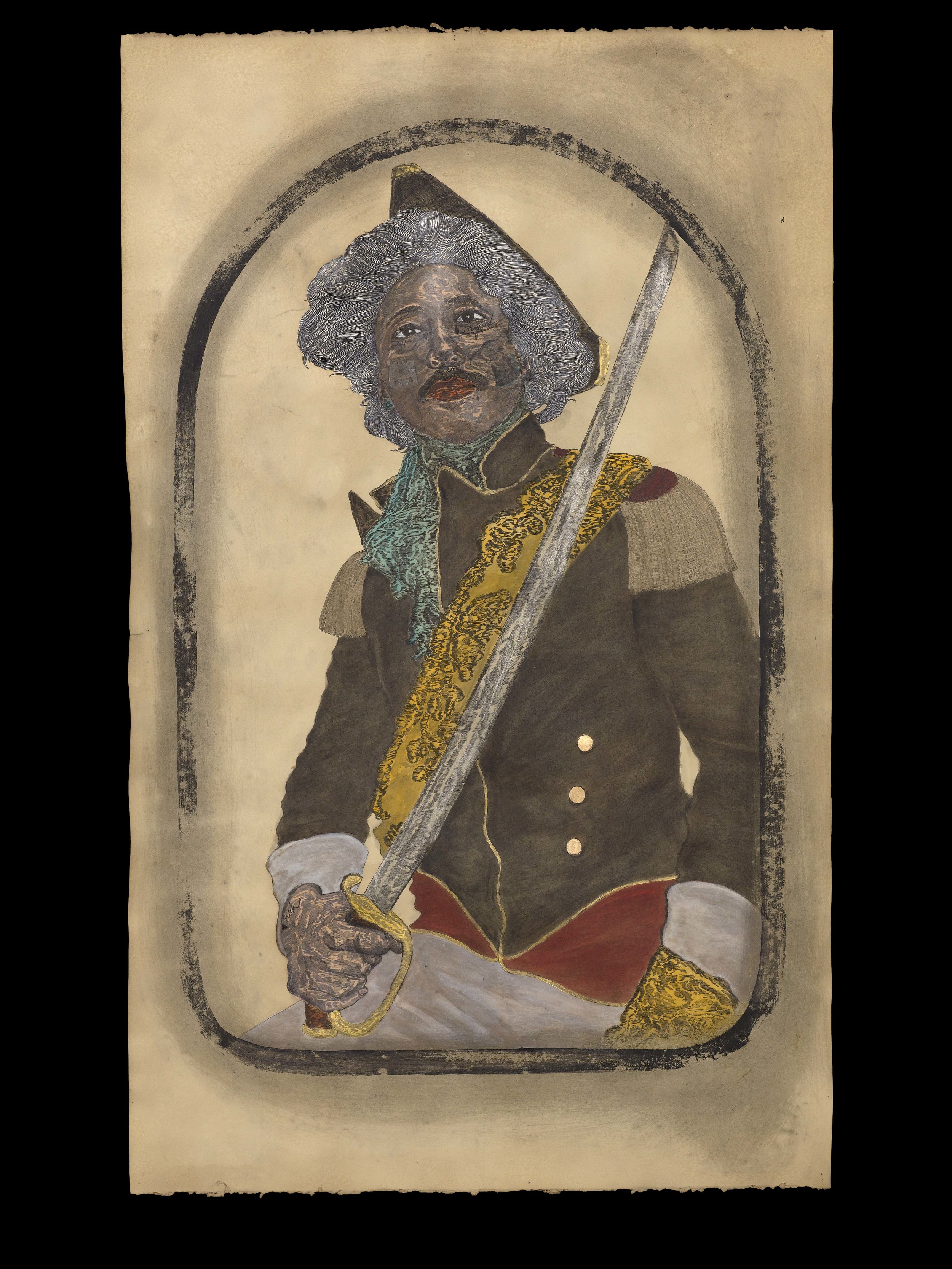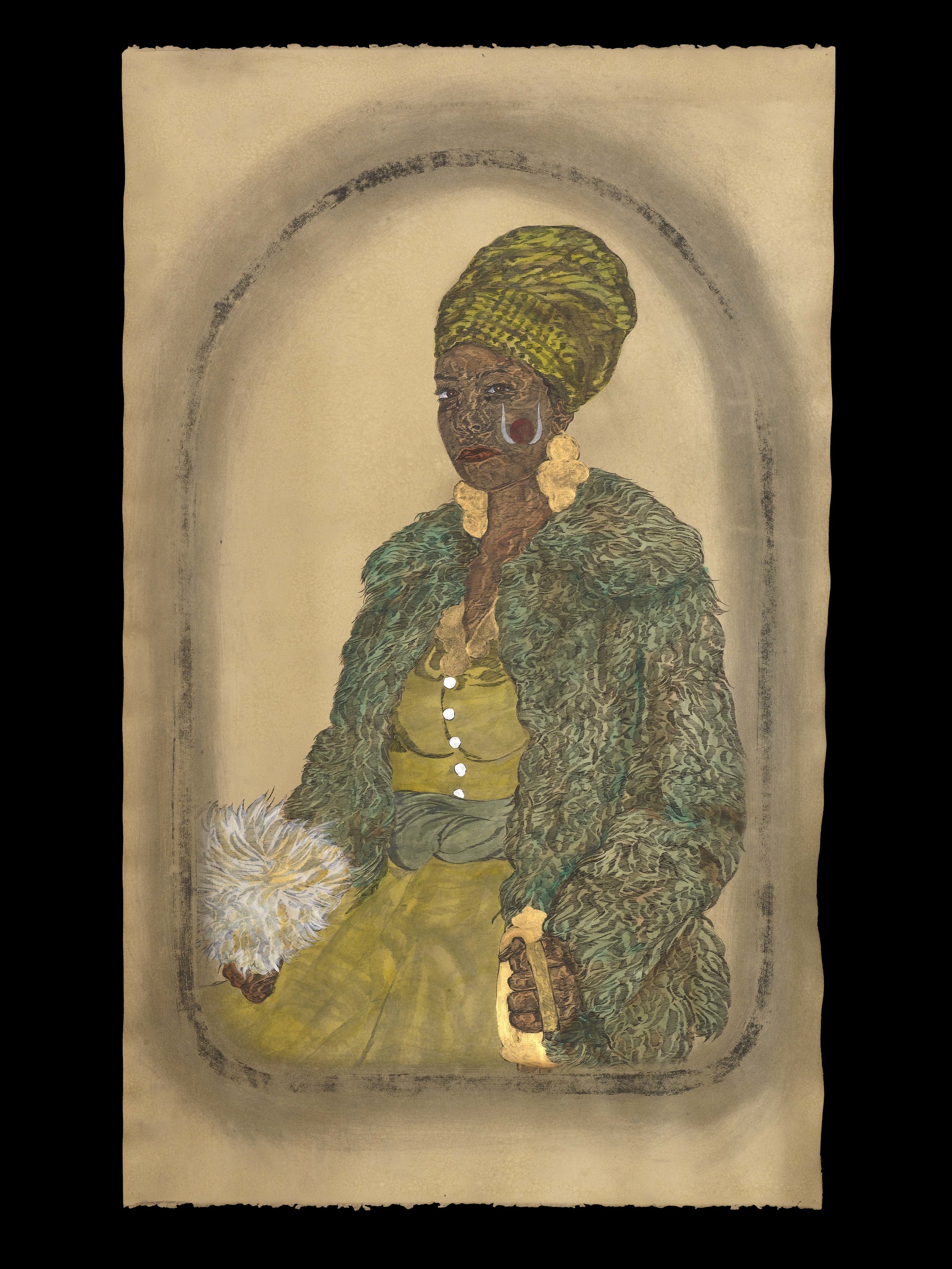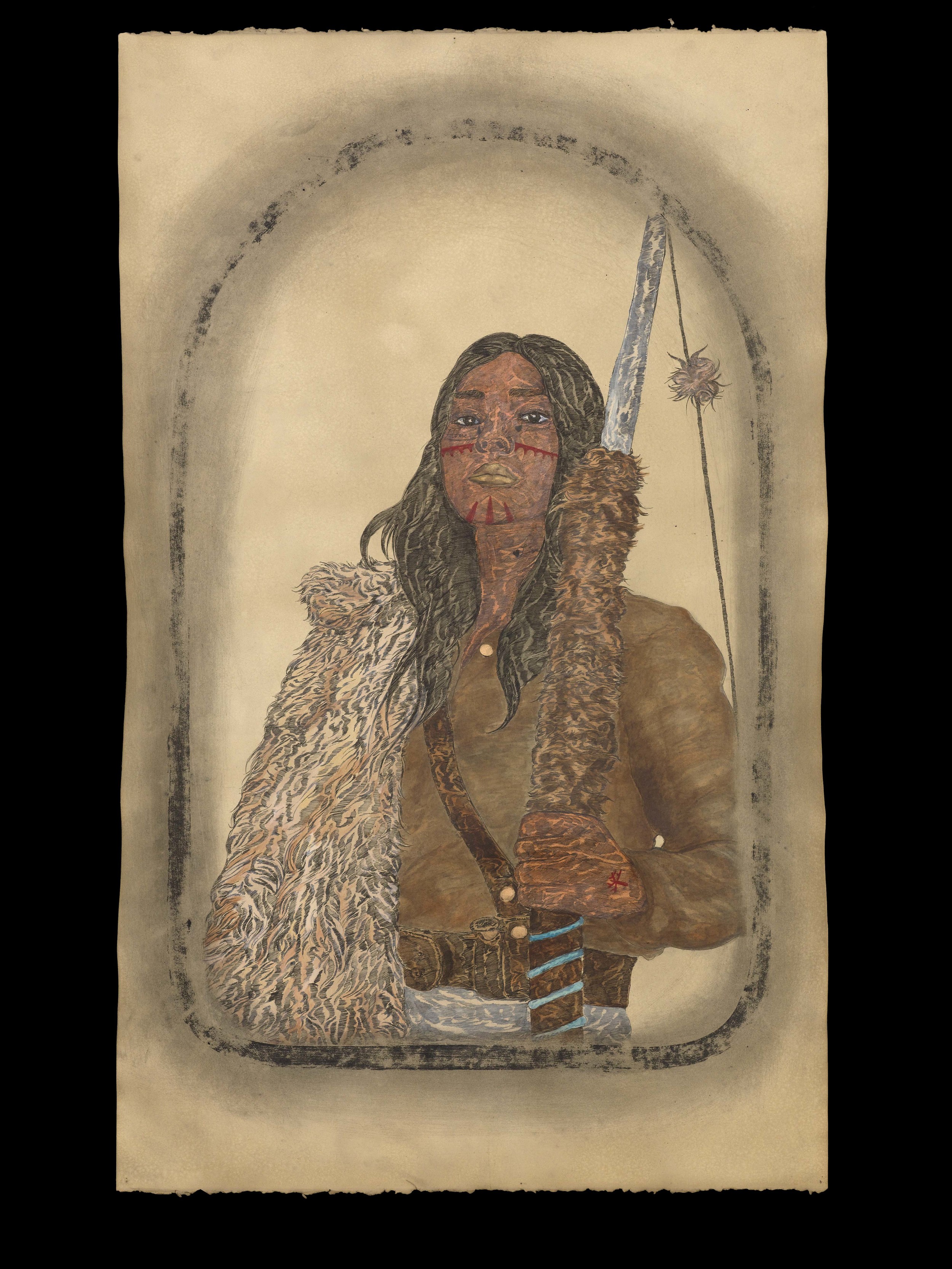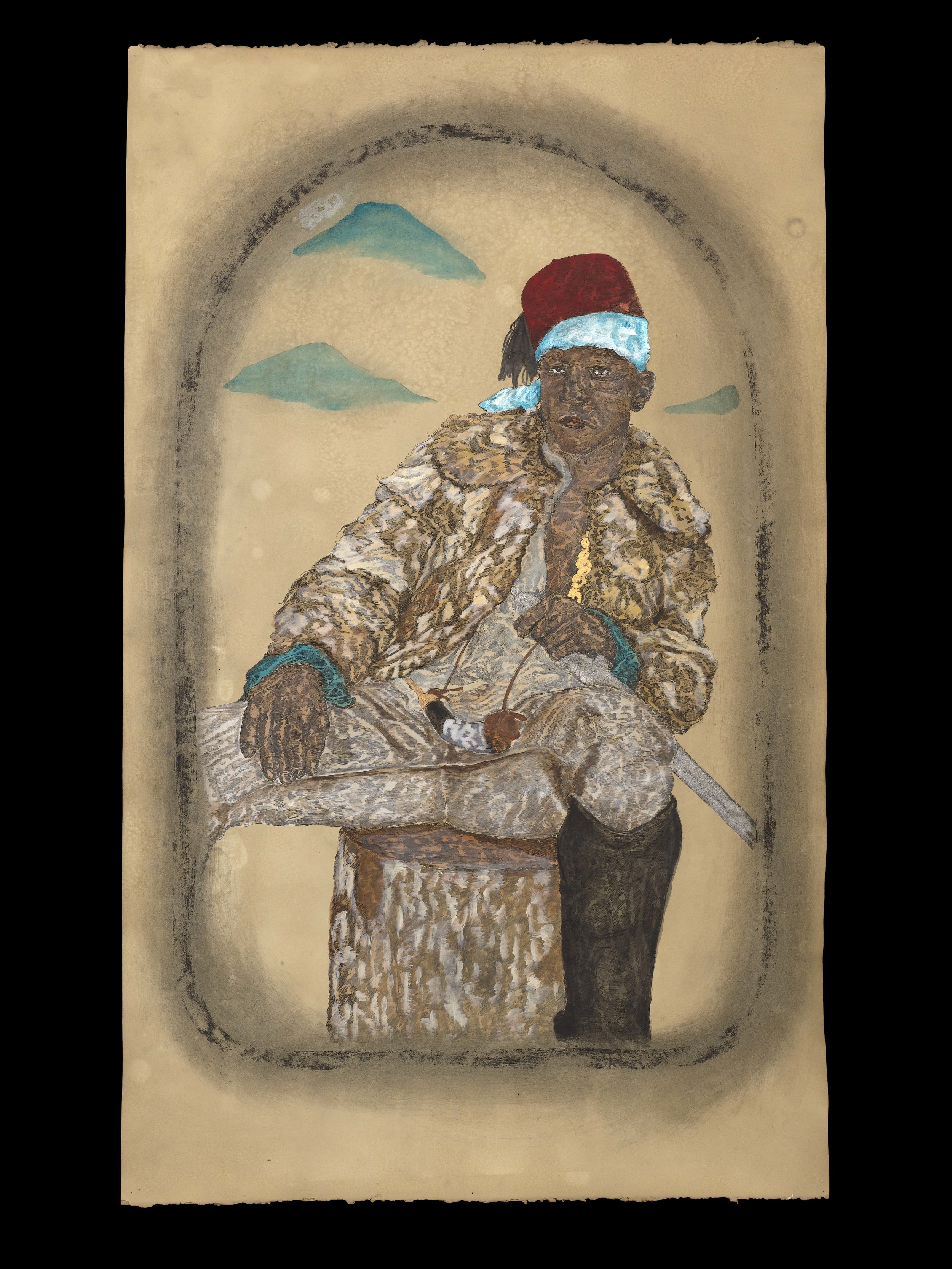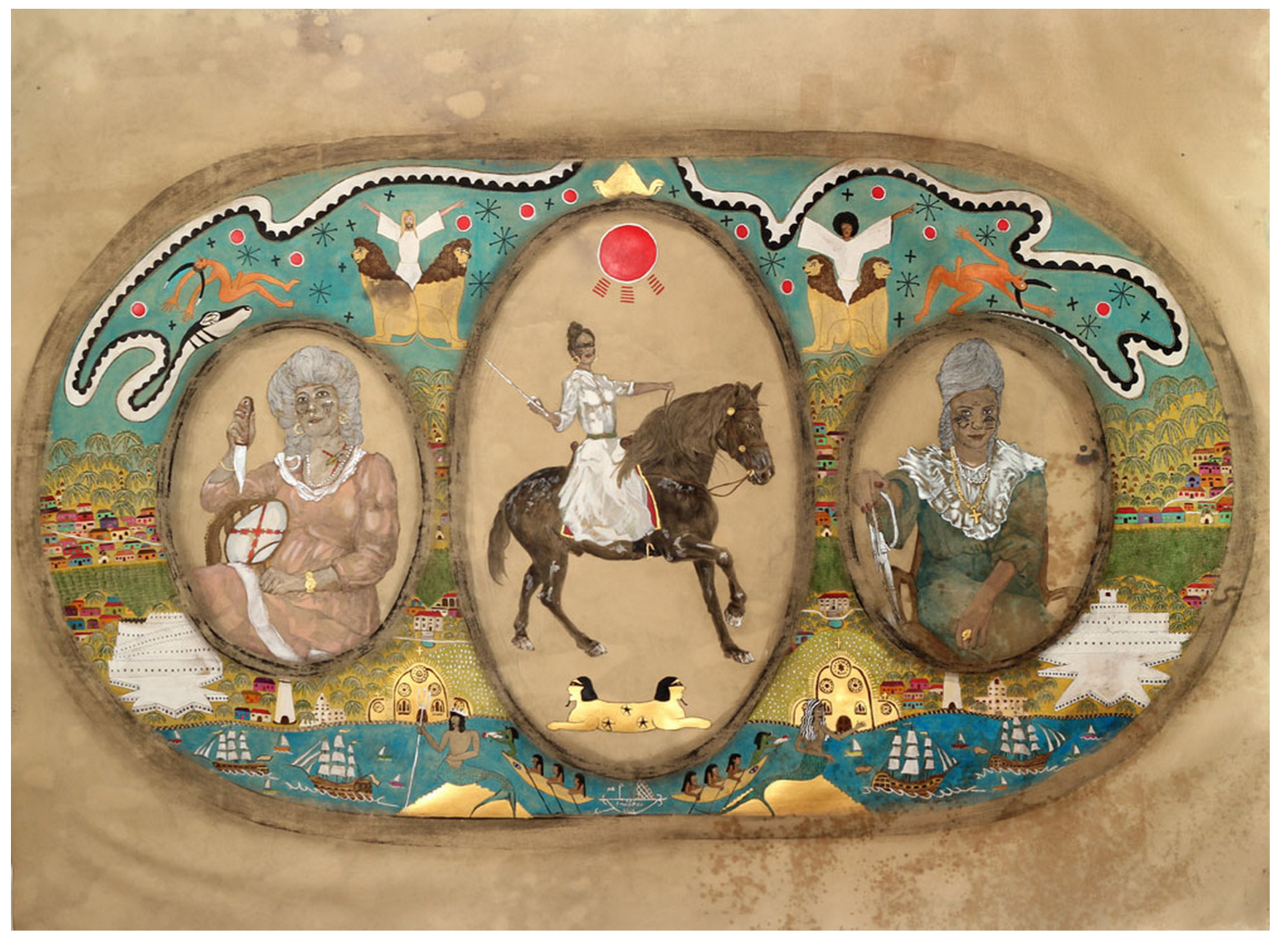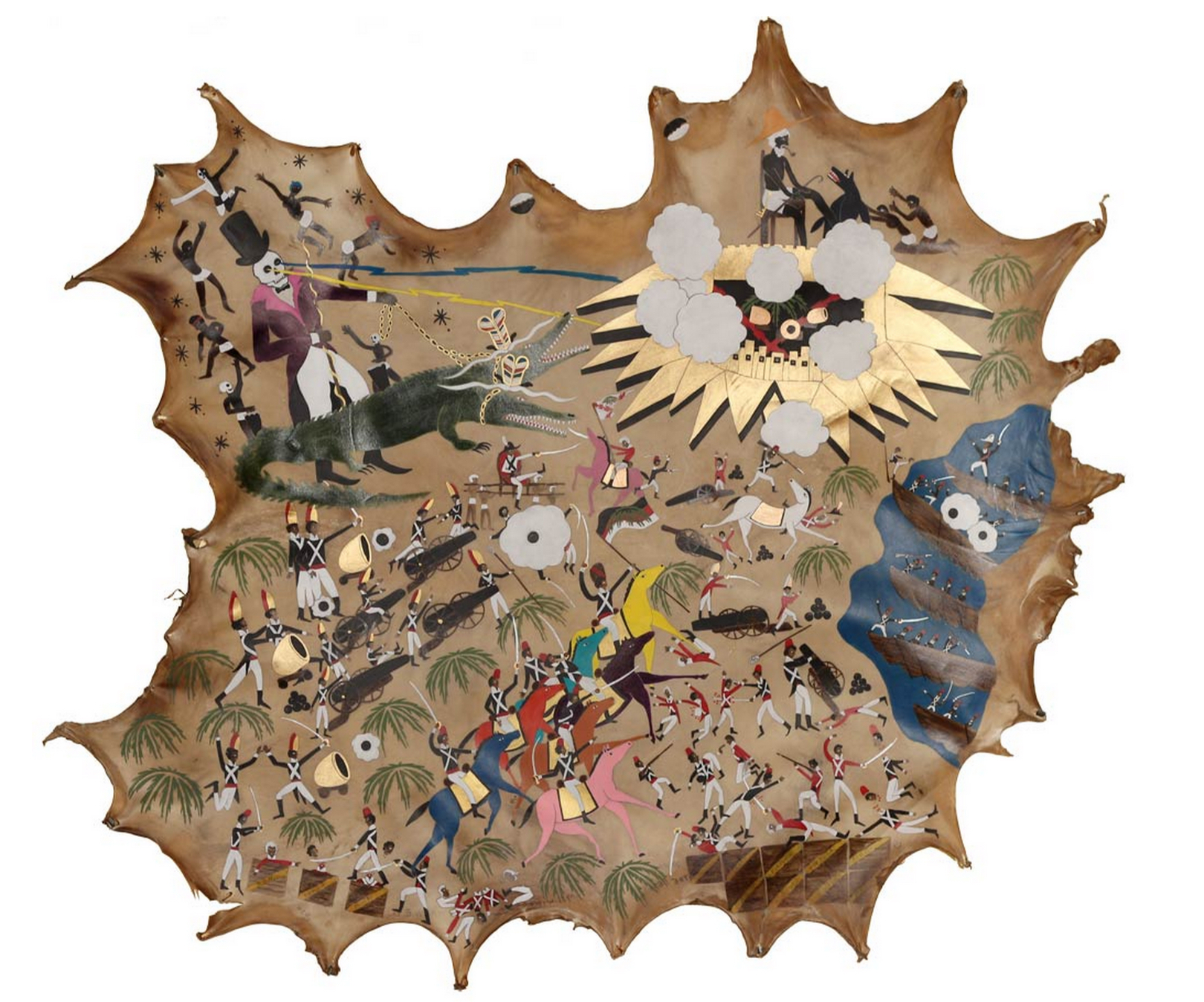Frohawk Two Feathers is the nom de plume for Los Angeles, by way of Chicago, artist Umar Rashid. For more then a decade, Frohawk has been building a sprawling fictionalized vision of European colonization, systems of power, infrastructures of military and mercantile oppression infused with profane madness and violence. His paintings detail an epic story unfolding over centuries and across continents that questions notions of truth and inevitability to create a humorous and troubling reflection of the roots of our, very real, modern world.
N|A: I thought we might start with just the actual aesthetic inspirations. What were some of those?
Frohawk Two Feathers: Basically it’s a whole lot of stuff. When I was a kid, I grew up on Greek and Roman and Norse mythology. To a lesser degree, Egyptian mythology. What actually influenced the dialogue was feeling that I really didn’t have a place, as a black American, not feeling connected to Africa, not necessarily connected to the U.S. But it didn’t stop my love for these stories; they’re timeless and transcend race, class; they’re just about people doing awesome shit. I started off mostly as a writer. Then after I moved to Los Angeles in 2000 I decided to start working on the Frenglish empire. By that time all that mythological stuff had morphed into more of a historical dialogue. It was like I was searching for myself. When I didn’t find it, I decided to create it.
N|A: That sense of questioning is really evident in your work. Can you expand a little on that, what artists you were looking at, before you left Chicago. I have read comparisons to your work and Henry Darger, mostly owing to the water-color and the idea of an extensive narrative, but I gather that was not really an influence for you?
FTF: No not really. I’m familiar with Darger’s work and his narrative, but at the time I was starting to create this work, I assumed I was creating out of a vacuum. Because I come from a photographic background, image-wise more of my direct influence would be James Van Der Zee the Harlem Renaissance photographer who photographed this black royalty. Random illustrations, Géricault, a lot of the French Revolutionary painters, some of the Renaissance romantic era painters, like Delacroix, Géricault, some of those people. I couldn’t match their level of style, so you take these really amazing things like “Napoleon Crossing the Alps” and then you break that down with a Van Der Zee portrait, and then you clash it together with my skill level. That’s what it is. But I get Darger a lot. Sometimes it’s like, ’is it just because Darger’s from Chicago and I’m from Chicago?’ But I don’t get upset when I hear my work compared to his, because I respect him. I think he was very good at what he did. Also there’s a lesser known artist who really, a lot of the expats who went to Japan around the Meiji restoration period, the late 19th Century, there’s one painter in particular, Paul Jacoulet who did woodblocks, but he did them from a European perspective, watercolor portraits of people. This is before Darger, I think he started during World War II, he was gay. I don’t know if he died there. I had a chance when I first went to Los Angeles before I started this particular narrative that we’re talking about now, I had a chance to look over some of his works at this framing gallery I worked at. So—direct inspiration: Van Der Zee, Jacoulet, French Romantic painters, Napoleonic era. And a little bit from the Victorian era. Even though my story doesn’t venture into the Victorian era per se, I just took information from there anyway. Visual and language.
N|A: What was the transition from photography to painting like for you?
FTF: That was a real simple transition. I moved to L.A. and I thought, “Yeah, I’m not going to get a job as a photographer so yeah....” Not what I wanted to do. I went to school at Southern Illinois University, and they basically taught us how to take really nice environmental portraits of the seal of a Fortune 500 company or they taught us how to make corn flakes look appealing. But they didn’t teach us how to be artists until the last couple of years. Then everything went digital. I mean, I was a fucking Jedi of the old order. When digital came down to photgraphy, I didn’t care to know anything about it. So I became a painter.
N|A: Let’s get into the whole narrative of the Frenglish empire. It’s so dense, it’s hard to even know where to begin pulling on the threads.
FTF: I happened to start the narrative in the mid 17th Century just because I didn’t actually want to change history. A common misconception about my work is a lot of people think I’m attempting to change history. But I leave a lot of it intact because I have to have some backbone in it. It has to have a structure for me to base my fictionalization upon. So I leave the structure up until after the English Civil War. When you look at things historically, and I know it’s about to get really boring right now, but historically, in my opinion, after the Elizabethan Age, England just kind of went to shit. It really went down. ‘ Yeah, we just defeated the Armada, we’re good, Sir Francis Drake, fuck shit up, get money, we run the world, Rule Britannia and all that.’ At the same time France is trying to work things out on the Continent. I know that historically the French and English, despite having common Norman ancestry, were always antagonistic with each other. So I use them, a combined French-British power, as my superpower. Once I came up with superpowers, I thought, England is in a bit of a flux, France is trying to work their muscle on the Continent. At the same time you have this horrible institution of slavery. Every body is getting all these commodities, like teak and sugar and spices, salt--motherfuckers didn’t even have salt. No Morton’s, no Lawry’s, no seasoned salt, no Mrs. Dash, nothing. These simple things that we take for granted everyday. So, I have it there was this French merchant named Bertrand who grew up in Haiti, so he decided, he had this slave force. Now I’m not trying to create this benevolent white man who comes through and saves everybody. He had this labor force that was good at sugar harvesting and they were good with machetes. So he decides to start this army military force called the Sugar Cane Army, much in the same way as Switzerland, how the whole state of Switzerland is based on their mercenaries, their ability to fight. Which most people don’t know. They think it’s all Swatches and international banking, but originally the Swiss were mercenaries.
N|A: Yeah, they were brutal.
FTF: They had these Swiss pikemen that were able to stop knights, that’s why the Vatican uses the Swiss Guard. They exported this, rented it out. So, Bertrand exports the trade of his slaves. Eventually they become free and become his fighting force. They help Louis Quatorze—my favorite monarch of the last 1000 years—just because of the balls on that guy. Louis XIV, called himself the Sun King, built Versailles to distract everybody, it’s awesome. You couldn’t make that shit up. So anyway, Bertrand goes to help Louis XIV, Louis betrays him, Louis dies. Actually, I’ve never done the beginning of the story. I started it in the middle. I started at the end actually. Now I’m starting in the middle, going to the end, then I’m going back to redo it. The old shit is like chain mail and horses and a lot of curtseys and bowing and shit. I ain’t got time for that. It’s really hard to draw armor, it’s a lot of white, a lot shadow. I’m not Caravaggio, man. I’m still learning as I go along. So they take the force to Europe, fight, come back and realize they could do the same thing for themselves, they could liberate themselves. I had this fighting force become the backdrop for the Haitian revolution, which almost happened in a similar way. The French were not necessarily lax, but in contrast to the puritanical or English way of doing things, the French put guns in the hands of people who were meant to serve them. And that was their eventual downfall. The Haitian Revolution was something I did my own version of. Right now I’m in the northeast, doing a narrative about that and the Native Americans there. Doing an exploded diagram of the conflict between the Iroquois and the Huron and their relationship with the Dutch, the English or the Frenglish, in my case. I think I answered your question with a lot of other questions.
N|A: That’s what I’m saying, it’s so dense it’s hard to figure out. Where you are now in the Northeast, America doesn’t exist as a country in your narrative but do Europeans arrive in the Americas at the same time?
FTF: Yeah, they’re already here.
N|A: Right, you’re starting in the 1600’s.
FTF: There’s your puritans, the Dutch are here, the Swedes are here, like Delaware, Jersey, New Sweden, New Netherlands, New England, New France. Because there’s no French and Indian War again. No Queen Anne’s War. That conflict doesn’t divide everybody. And there is no religious persecution; even though there are some puritan elements that are here, it’s mostly in the form of the Dutch Reformed Church instead of the English puritans. Because Frengland, the way that I made it was a very liberal society based on freedom of religion. And most of the religion that they really adhered to was this kind of invented Egypto-Christian-Muslim-Jewish religion. Basically, I’m not only writing this story, but I’m writing a history that I would have liked to have seen. Just for shits and giggles.
N|A: You said you’re not rewriting history. You also talk about not seeing yourself in the history and the connection of points when you were younger. What is this intersection, what is the theme? Are you just playing with history, or is there a larger question of what is history itself? The grand narratives and storytelling that is history?
FTF: The overarching story that I want to tell is, I actually wrote the beginning, the middle and the end to this story. So let’s start there. The beginning starts off where I set it, the middle part will be my version of the Napoleonic revolutions, and then the end would be the abolition of slavery in 1880. So I ended on the exact date I know this story ends in 1880. I could go further; maybe my kids might write it for me later on in the future, like Frank Herbert’s kids continued the Dune books. But it’s hard to say; when I created it again, I created this story so I could search for my own identify, which is also very complex and because there’s a lot that I don’t know about myself. There’s a lot that without a lot of money and free time that I probably won’t know, because the slave records weren’t well kept in this country, so like, even if I could, my only connection as a black American is , ‘go back to Africa’, I mean, where? Where should I go in Africa? They do these genealogy tests; ‘you’re 15%, it’s 98% sure you came from the Mende people.’ Yeah, they’re from Sierra Leone and a couple of other places, but how do you know who you’re related to? So there was just this feeling, this gap, and there was this hole in my heart that I needed to fill. But, at the same time I also thought that I could talk about other things, like how at the end of the day most of the problems that we face, they’ve always existed. Class warfare, racism, prejudice—we’ve dealt with these things as part of the human condition. I’m not saying we have to accept it, but you have to understand it and move forward, understand how it all went down. So basically I’m giving people a kind of condensed, very hyper-violent but cool and at times funny way of looking at history. So I don’t know if I have an overreaching story arc. It goes in and out. It goes from day to day. By the end of this, I want the whole world to fall into a long march against government.
N|A: You’re dealing with things like lost history, unknowable history. But you’re also dealing with completely invented history. Which in itself, is what historiography is. But there is just something really simple about the way you’re presenting it, that somehow those things come up to the surface.
FTF: I’m not trying to Clausewitzian on people, break it down, have my own philosophy around it. The philosophers who talked about it, you know, they were good enough. [laughs] But, I reference Hegel a lot in the work. Even Machiavelli with the duplicity of most of the characters I write about. And everything comes out because no matter what we call it, at the end of the day it’s still just fucking life. Life that we’re dealing with, that people before us dealt with. I’m just a storyteller.
Hopefully I’ll get a chance to finish it. But it’s long; I’ve been working on this North American narrative for 2 years. I have a lot of other narratives planned but it’s just so hard when it’s a global narrative, it’s hard to talk to people. And also, another mission statement of mine, and this is important, is that I want to give everybody a voice. It started out with me searching for my own identity as a black American male in the world. Then I thought, ‘Well, there’s a whole lot more highly marginalized history that you never hear about.’ You never hear about that one dude from Madagascar who fought a whole French division in the jungle. Now with the prevalence of the internet and the sharing of information, you have access to these narratives. They exist, but they’ve just been suppressed because history is always written by the victors. So if you lose, your story is lost. Maybe passed down orally, written down in some rotting manuscript in a chest locked away in the British Museum, whatever. It’s just gone.
The Spanish Main 1794 (3BB) Blanca, the motherfucking Queen of Spain Jacinta, Queen of the Tairona (Deceased) Carlota, Queen of Santo Domingo (Deceased). 2012. Acrylic, Ink, Tea, and Coffee on Paper. 44.75" x 60.5"
N|A: What’s interesting is that you’re presenting variations on what could have happened. Even when we discuss atrocities like what happened in the Americas with Native Americans and the ideology of Manifest Destiny, as a country we really still can’t deal with that topic. We have a holiday, every year, but we still can’t deal with it. Most people would admit to the atrocity or the genocide here, but there’s still a sense that it had to happen that way. We’re not prepared to actually say it could have been something else. There is still a deep belief that Manifest Destiny had to manifest itself in exactly that way. Which you still see in discussions about technology now. There’s that similar conversation about a certain ideology of progress being inevitable, you have to embrace this.
FTF: The way I understand the inevitability of certain things like technology and the inevitability of a quote, un-qoute ‘advanced’ race of people coming in and saying ‘Hey, you’re uncivilized.’ But, life is cyclical. No matter how civilized you think you are, eventually you will revert to a state of un-civilization. It’s not a conspiracy theory, but I have this interesting idea about the creation of the universe. People talk about these ancient cultures like Atlantis and Lemuria, and I think we’ve been on this kind of loop, never-ending. We’ll reach the apex of our technology, our military power, whatever, and then it’ll just collapse. And then those people will keep going and will come back and formulate some new society and the same thing happens, because we never, ever, ever, ever reference the past as much as we should. Like that quote, ‘If you don’t know history, you’re doomed to repeat it.’ I feel like this has been going on for a very, very long time. And also, you must forgive me, I watch a lot of science fiction films, and that’s another part of the story that you’ll start to see more and more. The science fiction part of this history, because now I’m having so much fun with it, but I’m tired of killing off my friends. Because I only use my friends, and I say, ‘Dude, I’m sorry I stabbed you twice, had you poisoned…you got the real Rasputin treatment.’
N|A: How does technology itself work its way into the narrative?
FTF: Through mainly the manufacture of goods, but most importantly through the military. I was actually studying what happened during the French and Indian War, why the French were unable to defeat the British. First, there just weren’t that many French people but also, simply, a lot of it was because the cannons weren’t powerful enough. But following this, in the late 1760’s there was a guy named Gribeauval who came along and invented this system to make this cannon, which was lighter and really mobile, and that it’s a big part of what happens with the French becoming such an imposing military force. Napoleon was an artillery officer, his claim to fame not only being a great tactician was to use artillery very effectively and this Gribeauval gun was crucial. Within this story, my version of the narrative of our history, most of the advancements come in the way of military rifles, pistols, swords, and kinds of cooking. I invented a couple of products, they’ll get more shine as the narrative goes along, but I invented the first canning process to feed soldiers on the march, well, I shouldn’t say invented, I introduced this process to my narrative. I also introduced a way of making sparkling rum. I get a lot of influence from my hip-hop and stuff. So there’s that element of my personal history that I like to bring into it, so there is this hip-hop element. Not only to do with liquor, but also the swagger, the characters, the bandanas, the overall visual aesthetic. There’s that. Also different hair-care techniques that I’ve invented or introduced. I think I will invent the Jheri-Curl in the next chapter.
N|A: There does seem to be a line that runs through gang culture, hip-hop, the cut-sleeves era of Bronx style and I’m wondering how that connects to the Zulu nation and also the tribal nations.
FTF: Where I grew up in Chicago, maybe it’s the curse of Al Capone, but Chicago’s always going to be known as The Gangster City. So where I lived and where I grew up, there were always gangsters and the gangsters were people you admired. I would never join a gang because my because of my parents. My dad’s a playwright and my mother’s was an educator and she was also in theatre as well. So I grew up in this theatrical world. Kind of a no-brainer where I ended up. I grew up in this household that was very cultured, and not even middle class. We were broke. Welfare broke. But that didn’t stop my parents from taking us to the museums and going to see things. My dad always made sure that was important, my mother as well. They were both really good at doing that. But still, when you’re a kid, you don’t give a shit about the good intentions of your parents for your future. You want to be like that guy with the really cool hair and the car.
So, despite all the greatness, all the great things my parents did, I was always intrigued by this gangster culture and I glamorized it over and over in my head. That was my royalty that I looked up to. It’s Reaganomics, the ‘80s, I was born in ’76, and so, I grew up in the worst part of the crack epidemic. So all these people had everything that I wanted at the time, with the exception of the high death rate, which I did not want. I stayed in the house, but I was always aware of who was doing what, and what was happening. So they became the archetype for a lot of my more successful yet tragic heroes in my narrative. Despite all their wealth, they might go good for a couple of years, then one day I’ll see them getting carted off to jail, or somebody putting a sheet over somebody or whatever. And some of the guys I’d totally despise, some of them were total assholes. But the real businessmen, the movers and shakers, they were always gentlemen, always chivalrous, as much as you could be in that particular business. And it’s no wonder they wielded power, maybe on the lower end of the spectrum, but where they were, they were kings. All of this really influenced a lot of the characters that I portray in my story.
N|A: Because your work deals explicitly with the historicity of representation, how does this romantic notion intersect with fraught concepts like that of the ‘Noble Savage’?
FTF: Before I got into photography, I was into film and the concept of the Noble Savage permeates a lot of the films that we watch, even today. Except now the Noble Savage has been replaced by the Magical Negro. Like Will Smith in “The Legend of Bagger Vance,” Michael Clarke Duncan in “The Green Mile.” I’m blanking on a lot of the classic examples, but of course, to a white Hollywood structure, “King Kong” does represent the Noble Savage. I hate to reference simians when speaking about black people because it’s just fucked up in a lot of ways you already know. Maybe the reason why I can’t think of these films right now is because there are just so many examples. There are a lot of Magical Negro characters in this story, but I haven’t expounded on them yet. But, definitely it’s there, a couple of my characters, especially Pompeii in this particular narrative, who is the guard/slave. While all the other black people around him are free and free to choose their own destiny, he’s still enslaved and tied to the Bonnie Prince Johnnie, and he has to follow him around. He has to leave his woman, has to, you know, go make all these contacts. He speaks Iroquois, he speaks Algonquin, all these languages, and he’s a brilliant man but relegated to this position of servitude. In pretty much every tale that I do write, there’s always a character like him. Before that it was Cicero. A lot of this comes from European history, in that a lot of Europeans tended to name their slaves after famous Roman statesmen. ‘This is my slave Spartacus, he is the strongest man, and he can lift 80 bales of wheat.’ ‘This is Cicero he works in the house.’ But, this actually happened, this is real history. I take it and try to make light of it, because I want people, not to be reactionary, to just take it as a story but then eventually—because it assaults you from so many different levels it starts to seep in and get into the psyche. Not that I want to mind-control people, because I would be ill suited to that particular task.
N|A: Do you think that doing it in your own way makes it easier to discuss some of these more complex ideas?
FTF: Exactly, because the way it is presented to us, well I would have to ask a Caucasian about how they feel about history but, the way it was presented to me was, ‘Oh yeah, we’re real sorry about slavery but… we got past it, and now we’re in post-racial-shoot-an-unarmed-teen-in-the-back-choke-a-man-in-the-street-America.’ The signals are all mixed up.
N|A: Right, and even in this fictitious rendering, which utilizes humor and, as you’re saying, certain contemporary reference points which come from pop culture and music etc. this process alone, being playful, being fun and evocative in this way draws attention to the ways narratives always get woven into ‘orthodox history’.
FTF: And at the same time, you can’t take the Haitian revolution and mire it with all this shit, because it was really hard. The Haitian Revolution, I don’t think people realize how difficult that battle was. So I also don’t seek to lessen peoples’ pain and conflicts, because I’m taking from actual history, even though it’s my own take. I do not seek to lessen anybody else’s conflict. At the end of the day, that was somebody’s ancestor who probably died unjustly. When you’re writing, as a responsible human being, I think it’s necessary to consider what I’m creating in the global context. I don’t want to hurt anybody, but people have to get hurt sometimes. What I want to build is cohesion, not drive people away.
N|A: Does your version of the history change religion as it develops in the Americas? I imagine that would be a fun thing to play with.
FTF: Oh, yes, it does. Well, religiously, I’ve probably been every religion under the sun, I switch religions like I change my underwear. Every day I find something new and I think, ‘this is such an amazing faith… oh wait, no it’s not.’ ‘This is great, this is… but yeah… I’m not really down for this end part. So what I’ve ended up doing is, everything is syncretic. So, it’s voodoo mixed with… which voodoo is actually as it exists in North America, it’s just basically African religions mixed with Catholicism.
The Siege of Santo Domingo-1974 or, through Papa Legba the way has been opened or, The bigger army always wins eventually. 2012. Acrylic, and Graphite, on Deer Hide. 49" x 54"
N|A: That’s what interested me about it, the way that religion develops in America is almost exactly what you’re doing: a reorganizing of history, this bit taken from there, conflated, and takes on almost science fiction bend.
FTF: Yes, it’s true, this is science fiction. We’re living in a crazy world. But I think it was necessary to put religion in because I wanted to talk about it. Around the same time I’m working in now there was that Egyptian revivalist movement, when Napoleon invaded Egypt and they found the Rosetta Stone… well that’s another thing, all these books, the way we look at history, even the titles are all completely misleading. Like ‘Discoverers of the New World.’ Shit, it was always there. There people here with better civilizations than yours, but you were just tired of living in shit over in Europe and decided to come over and try to get to Asia to try and spice up the meats. There’s an interesting book called “Seeds of Change” which I use, I think a college textbook, I use a lot as a reference. Like just the flavor of food. Why sugar was important, why salt was important, cumin, turmeric and all of this stuff is important. It’s amazing. Just so people could have a monopoly on things to have their food taste better. That is the dumbest shit in the world. Here’s a quote that was attributed to Napoleon: ‘You would think that the whole fate of Europe turned on a barrel of sugar.’ Because at first it was sugar. That’s how Bertrand enticed the British to join his cause after they got rid of the Stuart monarchy. They basically offered this lucrative deal in sugar. The proletariat, the people were won over.
